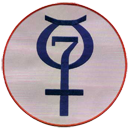For the second flight of a Mercury spacecraft in Earth orbit, Mercury-Atlas 7, Schirra was assigned as a backup pilot. When the originally nominated pilot, Deke Slayton, was denied the ability to fly, it was not Schirra, but rather Scott Carpenter.
Schirra’s first space mission was with Mercury-Atlas 8, when he piloted the spacecraft Sigma 7 around the Earth six times on October 3, 1962. This flight went down in NASA history as the “textbook space flight”. Schirra was the ninth person in space, including the fifth American.
Beginning in April 1964, he prepared for Gemini 3 for which he was assigned as backup commander. After this flight was successfully completed on March 23, 1965 by Virgil Grissom and John Young, he was given command of the next available flight: Gemini 6.
This flight was supposed to have been the first coupling of two objects in Earth orbit, but the operational plan had to be changed after a failed launch of the target satellite and instead called for a rendezvous with Gemini 7.
The third attempt carried Gemini 6 with him and Tom Stafford into Earth’s orbit on December 15, 1965, where, for the first time in the history of space travel, they conducted controlled approaches between two spacecraft.
After the successful mission of Gemini 6, Schirra moved to the Apollo program, where he was nominated as commander of the second manned flight on September 29, 1966. He was assigned Donn Eisele and Walter Cunningham. In November 1966, this flight was canceled and the three astronauts became the replacement crew for the first manned Apollo flight, Apollo 1. However, during a test on January 27, 1967, all three members of the main crew were killed and all crew assignments were temporarily canceled . Then, on May 9, 1967, Schirra, Eisele and Cunningham were announced as the crew for the first manned Apollo flight. This mission was now called Apollo 7.
Apollo 7 launched on October 11, 1968 and remained in orbit for eleven days. From a technical point of view, this flight went excellently, a rendezvous was made with the upper stage of the Saturn 1B rocket, and the first television images from an American spacecraft were sent to Earth.
Schirra had already announced that Apollo 7 would be his last space flight and left NASA on July 1, 1969. He worked as a chairman and managing director in several companies until he founded his own company, Schirra Enterprises, in 1979. He also served on the boards of several companies and did television commercials for Actifed, the drug he took during the Apollo 7 flight. Walter Schirra was married and had two children.
Walter Schirra died on May 3, 2007 at the age of 84 from complications of cancer at Scripps Green Hospital in La Jolla (California). His widow died in April 2015.
On October 13, 2000, the asteroid (8722) Schirra was named after him.

